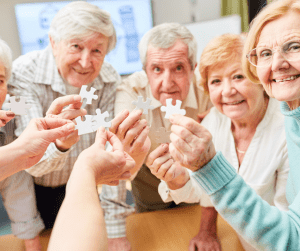Do you know someone who is living with dementia? If so, you may be looking for ways to help make their life a little easier. One great way to do this is by introducing them to jigsaw puzzles. Jigsaw puzzles are a great way to stimulate the mind and can help improve cognitive function. In this blog post, we will discuss the benefits of jigsaw puzzles for dementia patients and provide tips on how to get started!
What is dementia?
Dementia is a progressive brain disorder that causes problems with memory, thinking, and behavior. The symptoms of dementia can vary from person to person, but they typically worsen over time. Dementia affects people of all ages, but it is most common in older adults.
There is no one cause of dementia, but there are certain risk factors that can increase your chances of developing the condition. These include things like age, family history, and lifestyle choices. There is no cure for dementia, but there are treatments that can help slow the progression of the disease.
Why are jigsaw puzzles?
Jigsaw puzzles are a great way to keep your mind active and engaged. They can help improve your memory, cognitive function, and problem-solving skills. Jigsaw puzzles are also a fun and rewarding activity that can be enjoyed by people of all ages.
There are many different types of jigsaw puzzles available, so you can find one that is perfect for your skill level. You can also find puzzles that feature your favorite images or themes. Whether you are a beginner or an experienced puzzler, jigsaw puzzles are a great way to keep your mind sharp.
Benefits: Jigsaw puzzles for dementia patients

Jigsaw puzzles can provide many benefits for people living with dementia and Alzheimer’s disease. Here are some of the ways that jigsaw puzzles can help:
1. Stimulate the mind:
Jigsaw puzzles help to stimulate the mind and can improve cognitive function. The act of solving a puzzle requires you to use memory, problem-solving, and critical thinking skills. The cognitive stimulation provided by jigsaw puzzles can help to slow the progression of dementia.
2. Improve memory:
Jigsaw puzzles can also help to improve your memory. As you work on a puzzle, you will need to remember the location of the pieces and how they fit together. This can help to improve your short-term memory and spatial awareness. The memory and brain function benefits of jigsaw puzzles have been well-documented in scientific studies.
3. Enhance fine motor skills:
Jigsaw puzzles can also help to enhance fine motor skills. The act of picking up and placing small pieces requires a high level of dexterity and hand-eye coordination. Working on jigsaw puzzles can help to improve these important skills.
4. Boost mood and self-esteem:
Jigsaw puzzles can also be a great way to boost your mood and self-esteem. The sense of accomplishment that comes from completing a puzzle can help to improve your outlook on life. Jigsaw puzzles can also be a fun and social activity that you can enjoy with friends or family.
5. Reduce stress:
Jigsaw puzzles can also be a great way to reduce stress. The relaxing and meditative act of working on a puzzle can help to take your mind off of worries and concerns. Jigsaw puzzles can provide a much-needed break from the hectic pace of everyday life.
6. Boost brain power:
Jigsaw puzzles can help increase your brain power and IQ. The more you challenge your mind, the stronger it will become.
7. Delay dementia:
Jigsaw puzzles can help delay the onset of dementia. Studies have shown that people who regularly engage in activities that stimulate the mind are less likely to develop dementia.
Other games good for dementia patients
Jigsaw puzzles are not the only type of game that can help people with dementia. Other games that can provide cognitive benefits include:

1. Crosswords: Crossword puzzles are a great way to improve your memory and problem-solving skills. They can also help to increase your vocabulary and general knowledge. Crossword puzzle participation has been linked with a reduced risk of dementia.
2. Sudoku: Sudoku is a great game for people of all ages. It can help to improve your logic and problem-solving skills. It’s a good cognitive exercise for people with dementia. Sudoku can also be a great way to reduce stress and relax.
3. Memory games: Memory games are a great way to improve your memory and cognitive function. They can also be a lot of fun.
4. Board games: Board games are a great way to improve your critical thinking and strategic planning skills. They can also be a lot of fun.
5. Card games: Card games are a great way to improve your memory and critical thinking skills. They can also be a lot of fun.
Which jigsaw puzzle is best for dementia patients?
The best jigsaw puzzles for people with dementia are those that are both challenging and enjoyable. The type of puzzle you choose will depend on your individual preferences and skill level. If you are a beginner, you may want to start with a simple puzzle with just a few pieces. If you are more experienced, you may want to try a more challenging puzzle with more pieces.
No matter what type of jigsaw puzzle you choose, make sure that you have fun with it. The most important thing is to keep your mind active and engaged. Jigsaw puzzles can be a great way to do just that.
How do you get started with jigsaw puzzles for dementia patients?
Choosing the appropriate puzzles for a dementia patients is critical for success. jigsaw puzzles for dementia patients should have the following characteristics:
- Puzzles with large pieces are best for those who are beginning to lose their vision.
- Puzzles with bright colors are easier for those with dementia to see.
- Puzzles with simple designs and plenty of white space are less confusing for those with dementia.
- Puzzles with interesting themes, such as animals or nature scenes, are more likely to hold the attention of someone with dementia.
Once you have chosen the right jigsaw puzzles for your loved one, it is time to get started. Here are a few tips to help you get started:
- Start with a small puzzle. Choose a jigsaw puzzle with just a few pieces to start. This will help your loved one get used to the idea of working on a puzzle and give them a sense of accomplishment when they finish.
- Work on the puzzle together. Sit down with your loved one and work on the jigsaw puzzle together. This will help them feel more confident and motivated to continue working on the puzzle.
- Take breaks often. Dementia can be exhausting, so make sure to take breaks often. Get up and stretch, take a walk, or have a snack. This will help your loved one stay focused and avoid getting too frustrated.
- Praise their progress. It is important to praise your loved one for their efforts, no matter how small. This will help them feel good about themselves and encourage them to keep working on the puzzle.
Final thoughts: Jigsaw puzzles for dementia patients
Jigsaw puzzles can be a great way to improve the cognitive function of someone with dementia. Choose the right puzzle, start slow, and take breaks often. With a little patience and effort, you can help your loved one enjoy this fun and beneficial activity.

